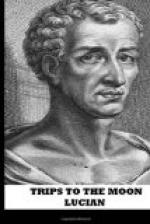The endeavour of small Greek historians to add interest to their work by magnifying the exploits of their countrymen, and piling wonder upon wonder, Lucian first condemned in his “Instructions for Writing History,” and then caricatured in his “True History,” wherein is contained the account of a trip to the moon, a piece which must have been enjoyed by Rabelais, which suggested to Cyrano de Bergerac his Voyages to the Moon and to the Sun, and insensibly contributed, perhaps, directly or through Bergerac, to the conception of “Gulliver’s Travels.” I have added the Icaro-Menippus, because that Dialogue describes another trip to the moon, though its satire is more especially directed against the philosophers.
Menippus was born at Gadara in Coele-Syria, and from a slave he grew to be a Cynic philosopher, chiefly occupied with scornful jests on his neighbours, and a money-lender, who made large gains and killed himself when he was cheated of them all. He is said to have written thirteen pieces which are lost, but he has left his name in literature, preserved by important pieces that have taken the name of “Menippean Satire.”
Lucian married in middle life, and had a son. He was about fifty years old when he went to Paphlagonia, and visited a false oracle to detect the tricks of an Alexander who made profit out of it, and who professed to have a daughter by the Moon. When the impostor offered Lucian his hand to kiss, Lucian bit his thumb; he also intervened to the destruction of a profitable marriage for the daughter of the Moon. Alexander lent Lucian a vessel of his own for the voyage onward, and gave instructions to the sailors that they were to find a convenient time and place for throwing their passenger into the sea; but when the convenient time had come the goodwill of the master of the vessel saved Lucian’s life. He was landed, therefore, at AEgialos, where he found some ambassadors to Eupator, King of Bithynia, who took him onward upon his way.
It is believed that Lucian lived to be ninety, and it is assumed, since he wrote a burlesque drama on gout, that the cause of his death was not simply old age. Gout may have been the immediate cause of death. Lucian must have spent much time at Athens, and he held office at one time in his later years as Procurator of a part of Egypt.
The works of Lucian consist largely of dialogues, in which he battled against what he considered to be false opinions by bringing the satire of Aristophanes and the sarcasm of Menippus into disputations that sought chiefly to throw down false idols before setting up the true. He made many enemies by bold attacks upon the ancient faiths. His earlier “Dialogues of the Gods” only brought out their stories in a way that made them sound ridiculous. Afterwards he proceeded to direct attack on the belief in them. In one Dialogue Timocles a Stoic argues for belief in the old gods against Damis an Epicurean, and the




